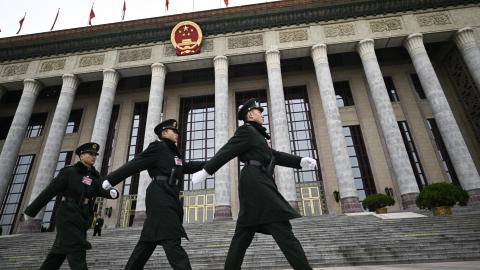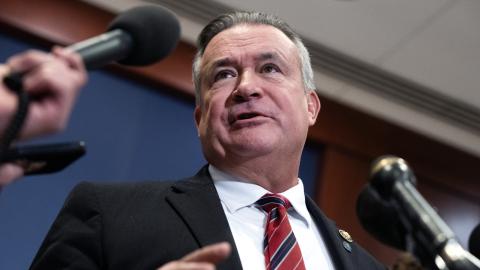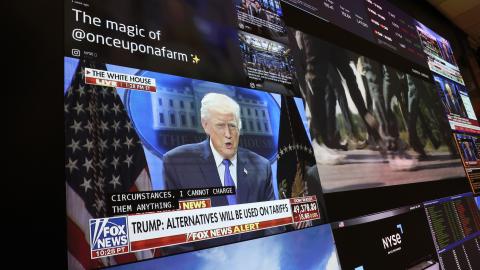
The Evolving Indo-Pacific Order with Foreign Minister of Singapore Vivian Balakrishnan
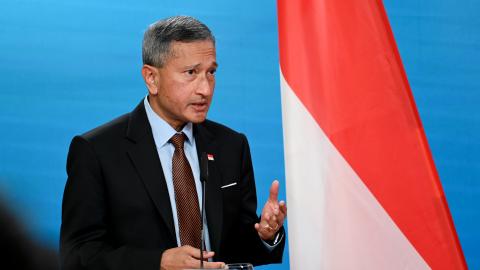
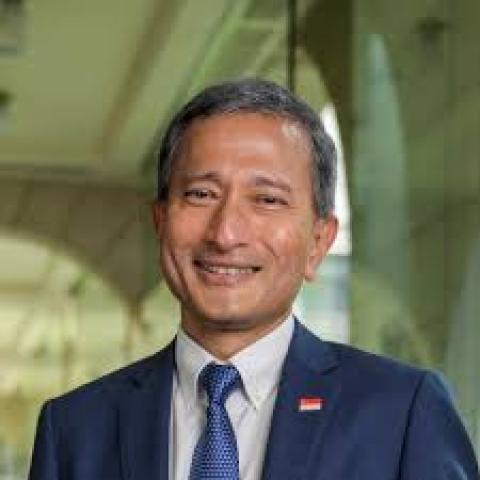
Minister for Foreign Affairs, Singapore

Asia-Pacific Security Chair
Patrick M. Cronin is the Asia-Pacific security chair at Hudson Institute. His research analyzes salient strategic issues related to US national security goals in the Indo-Pacific region and globally.
Singapore stands at the crossroads of traditional maritime routes and the forefront of rapidly evolving digital and energy infrastructure, making it a crucial partner amid great power rivalries and shifts in global trade dynamics. It is also a diplomatic locus, hosting increasingly vital gatherings like the Shangri-La Dialogue. This strategic position has helped Singapore forge enduring partnerships—including its vital relationship with the United States.
The US-Singapore relationship is one of America’s strongest partnerships in Asia, built on decades of trust and mutual strategic interest. In the face of emerging challenges and opportunities, the relationship has extended beyond traditional pillars like defense and commerce into frontier areas including artificial intelligence and biotechnology.
Singapore’s Foreign Minister Vivian Balakrishnan will join Hudson Asia-Pacific Security Chair Patrick Cronin to explore critical questions facing Singapore, Southeast Asia, and the Indo-Pacific.
Transcript: The Evolving Indo-Pacific Order
This transcription is automatically generated and edited lightly for accuracy. Please excuse any errors.
Patrick Cronin (Moderator): Hello everyone, I’m Patrick Cronin, Asia-Pacific Security Chair at the Hudson Institute. It is a great honour today for Hudson to host the Foreign Minister of Singapore, Dr Vivian Balakrishnan, who has been the Minister of Foreign Affairs of Singapore for over a decade. His tremendous experience, he’s a real medical doctor, so his experience is tremendous as a humanitarian, as a medical professional, but also the last 20 years in politics, in leading the Foreign Ministry of a critical partner of the United States in the Indo Pacific, in Singapore. So without further ado, I want to welcome Dr Balakrishnan to give some initial comments.
Vivian Balakrishnan: Thank you, Patrick and thank you, ladies and gentlemen.To be honest, I am bit surprised to see so many of you here on an afternoon where you could be doing many other things in this lovely place.
I come from a tiny city state called Singapore in the heart of Southeast Asia, 700 square kilometers in size. I checked, that makes us slightly smaller than New York City, slightly larger than Chicago, except imagine upstate New York ejecting New York City and saying:“you have to be an independent, sovereign entity”.
In fact, we are younger than the Hudson Institute, which was founded in 1961. Singapore became independent in 1965, and we have had some measure of success in the six decades since. For instance, our per capita GDP at independence was USD500.Today, I think it is somewhere north of USD80,000. Not bad for a six-decade run. Now, of course, first question that arises is what happened? How did that happen? I would say the first factor, is to give credit to hardworking and disciplined people. If you do not believe me, come and visit Singapore and meet my people. A second factor, a competent, honest, pragmatic leadership. I will not get into that, we have just had an election, so I do not need to belabour the point. But there is a third factor that turbocharged the development of Singapore in the last six decades, and that actually begins with Pax Americana and the fact that the real winner of the Second World War was the United States of America. What was so unusual and remarkable was the fact that America was an incredibly magnanimous victor.
Now just think about it. If you were to google the top five countries or economies ranked by GDP today, America is number one; China is number two, but number three and four, Germany and Japan, were countries that America defeated. The point is, at the end of the Second World War, America, which constituted 40 percent of global GDP, rebuilt countries it vanquished and established a rules-based system of globalisation characterised by economic integration. Its companies–the biggest companies, the most successful companies in America–became multinational corporations, and built up global supply chains.
Now think about what that meant for a tiny city state with no hinterland, no resources, no oil, no gas, nothing except people willing to work very hard. What it meant was that we could plug into an emerging globalised economy. In the 60s and 70s, before the word globalisation became popularised, we were forced to plug ourselves in, because we had no hinterland. So the point I am trying to make here is that this very unusual and unique period in history where America and its vision underwrote globalisation–characterised by economic openness, a rules-based system, and also American support for the United Nations, the Bretton Woods institutions, the IMF, the World Bank, the WTO, the WHO–actually set a global stage for many countries, who adopted models compatible with this system to do very well. And you can find books by Herman Kahn, the founder of Hudson Institute, talking about the Asian tigers, like Japan, Taiwan, South Korea, Hong Kong and Singapore.
That is the first point I wanted to leave with you, that Pax Americana was a unique, incredible period of 80 years. Many of us benefitted, but you would notice that I also made the point that when you look at the ranking of GDP, number two is China. And the point here is that, in fact, the biggest beneficiary of Pax Americana–now again, start off by giving full credit to the people in China who worked really, really hard to get to where they are today. But actually, like Singapore, except on a much bigger scale, it really turbocharged the development after 1978 when Deng Xiaoping embarked on reform and opening. And so you now end up with today’s world.
One other statistic which I want you to bear in mind is that the share of global GDP of America is no longer 40 percent, it’s now about 26 percent. Now, in absolute terms, America’s GDP has grown. The American economy actually is the envy of many other economies all over the world, but that relative share has shrunk, and the point I wanted to leave you with is that at 26 percent it is a completely legitimate question for the American voter to say why should Americans underwrite and pay in blood and treasure to keep this multilateral rules based system, which in fact, has been beneficial to almost everyone else in the world. The point is not to be pejorative or to exercise a value judgment, but just say it is a legitimate question.
And so that brings us to today, and from a Singapore or Southeast Asian perspective, this is the end of an era. There is no point crying over spilt milk or hearkening for a rose-tinted past. Recognise that this is the end of an era. We do not quite know what the new world order will look like, but what we do know from history is that the interaction between an old world order and a new world order is when things get hairy, when things get dangerous, and that transition can be chaotic, unpredictable, and can be very awkward. That is the stage we are in right now.
After that stage, assuming we survive and thrive, we then get to an emerging new world order, which, as I said, you cannot predict exactly how it will turn out, but what is fair to say is that we are transiting from a unipolar world into a multipolar world. Where are the poles of the new world order? As far as Singapore is concerned, we expect America to still be one majorpole. We do not count America out. China will obviously be another pole. But it is not going to just be a bipolar world, because if you add up what is going on in other parts of the world, the EU-27 even minus the United Kingdom. If you add up their combined GDP, it is in the same ballpark between the US and China.
Then if you look at India, which is now the world’s most populous country, it is already number five. But I am also here to make the point that if you add up the combined GDPs of the 10 countries in the Association of Southeast Asian Nations (ASEAN), it actually gets into the Indian league. The key point here is that we have a demographic dividend for both India and Southeast Asia so long as we get our act together, so long as there is no war in Asia, in the Asia Pacific, or even in South Asia, these are two regions where you can expect significant growth, and I have not even included extended discussions into the Gulf and Latin America, which we believe to also have significant growth potential. So that is for the longer-term future.
Coming back to today, what is Southeast Asia concerned with? First, trade and tariffs. I cannot underestimate the impact of the Liberation Day announcements for many, if not for all of us in Southeast Asia. It is not just the headline or the number. The disruption goes far deeper than that because what it actually means is that once you have reciprocal tariffs ‒ country by country ‒ it represents a complete rejection of the Most Favoured Nation principle, which is a key organising principle under the World Trade Organization. In fact, this concept predates even the Generalized Agreement on Trade and Tariffs. If this becomes the norm, every economic agreement becomes a bilateral arm-wrestling match. Not only does this mean a rapid expansion in the number of economic agreements, but it also means a world where might means right and small countries ‒ small states like Singapore would obviously be at a disadvantage. Second, because trade is three times our GDP, any friction in global trade would have significant secondary impacts on a place like Singapore. Third, we are all watching what happens between China and America. If you think about what complete decoupling means ‒ we hope we do not get there ‒ but nevertheless, there are three immediate implications of decoupling.
First, it will be inflationary. Why? Because for 80 years, we have organised global supply chains on the basis of efficiency and competitive advantage. Managing inventories was the organising principle, or “just in time”. If you now prioritise resilience and national security, and if you overdo that dial, by definition, you are no longer working on the basis of cost effectiveness and efficiency. You will not be organizing your inventories on the basis of “just in time”; it will be “just in case”. It must mean higher prices, and that is quite apart from the impact of tariffs on prices. So that is the first impact ‒ inflation. Second, if you have significant decoupling, you really set the stage for a more disrupted, dangerous world, because interdependence is reduced and the downsides of embarking on disruption are apparently reduced, so you will get a more bumpy, spiky and awkward world. The third point is ‒ I think, a point which Herman Kahn would have appreciated because he was a techno-optimist ‒ is that for at least a century or two, the world has operated basically on a shared and single technological stack. You make a discovery; you file a patent; you publish how you did it; you have a temporary monopoly. Others get to work on your discovery. You stand on the shoulders of giants. Science and technology accelerate, and accelerate increasingly quickly. In fact, we are now on the cusp of a revolution because of digital technologies, especially AI, the energy transition and biotechnology. But if in the name of national security and geostrategic contests, you break that apart, instead of all of us working on a single stack, we are now in two different and maybe isolated stacks. It must mean a reduction in the speed of progress. So yes, we do have fundamental concerns, and I thought I should stop here to take questions, and hopefully I will be able to end on a more optimistic note at the end of the session. Thank you.
Cronin: Minister, thank you very much. You have gone straight for some of the big questions about this global order that we are in transition to, and what we are going through. You have also started to discuss the US-China relationship, and you have certainly brought up the issue of trade and tariffs. I want to come back to those issues, but I thought we could start with a question about the bilateral relationship between Singapore and the United States. You were foreign minister during the first Trump Administration, and you had significant success. Singapore had significant success with the first Trump Administration. I remember the memorandum of understanding, updating the facilities agreement. You hosted the Trump-Kim Summit, which we will come back to, perhaps in a later question. You had a very successful partnership. How is it going in Trump 2.0, five months into this Administration?
Vivian Balakrishnan: Let me back up a bit. You know, I started off by saying we were a beneficiary of Pax Americana, but that is in general terms. More specifically on a bilateral level ‒ 60 years ago, during our independence, Singapore had to make one decision, which is: do we choose a communist developmental model, or do we go for free markets? Fortunately for Singapore, our leaders chose an open economic model. Bear in mind, this is year 1965. What was America doing in 1965 or in the 50s for that matter? It fought wars in Korea and was engaged in Vietnam. Whatever today’s thoughts or sentiments in America about those wars are, for non-communist Southeast Asia, America bought time and space for us to prove that this economic model of openness, integration, trade and investments worked. Second point, if you ask me who the biggest foreign investor in Singapore is ‒ and which I used to remind President Trump in his first term ‒ America is the biggest foreign investor in Singapore by far. In fact, America has more foreign direct investment in Southeast Asia than in India, China, Japan and Korea combined. If you work through those numbers, a big chunk of that is in Singapore. It is not just about money. American investment in Singapore ‒ and there are 6000 American companies in Singapore ‒ gave us access to technology, markets, and management. It helped to bootstrap and build a level of sophistication in our economy. Now, because of America’s security and economic engagement, America has been a welcome, benign and benevolent hegemon. Hegemon is usually a pejorative term, but America has been a welcome force for stability and development in Southeast Asia generally. The reason why we have such close defense ties with the US is because of appreciation on our part for America’s presence in our part of the world, which helps to provide security; helps to provide a stable balance of power; and helps to underwrite the security needed to promote globalisation. That is why you are referring to the memorandum of understanding in which America uses Singapore for logistics support for rotational deployments. On the defence front, Singapore used to spend three to six percent of GDP on defense.
President Trump was quite happy when he heard us express that, because at that point in time, in his first Administration, he was trying to persuade others to even come up to two percent. So we told him, Mr. President, we spend three to six percent and we have conscription. All the men served two years in the Army, in the armed forces. Yes, we appreciate privileged access to American technology, but we do not expect America to defend us. We will defend ourselves.
So, it has been a very close relationship based on trust, based on mutual respect, based on mutual benefit. Fast forward to today, I would say the foundational pillars of that relationship remain. As I said, we do not believe that America is in terminal decline. We do not engage in stone throwing on American domestic politics. We understand even this question about America’s commitment to globalisation, and I think these are legitimate political questions. So, I’m here to reconnect with the Administration, which we are not unfamiliar with. I’ve also came to remind the President; you have a trade surplus against us. We have had a trade, free trade agreement with America since 2004 and almost all the time, you have had a trade surplus, and it is growing. And then I used to tell the President, but we are not complaining, because, from our perspective, we do not look at the bilateral trade balance. We look at the overall growth of the economy and the jobs, wages and Singapore’s role in the global economy.
So, for all these reasons, economic security, defence, access to technology, we will work things out even in these Liberation Day tariffs. It helps that we are at 10 percent which I think is almost a kind of a baseline, perhaps revenue raising measure. We still have concerns about sectoral tariffs, but we will see how that works out. But what I am reassured is that we are not the primary target of these tariff measures, but I have expressed concern that the secondary impact can affect us adversely, and that is what we need to work through carefully in the months to come.
Cronin: Well, that is a wonderful answer to a difficult question. You are a secondary target, both in terms of potential trade war tariffs and decoupling with China, but also potential conflict. I know Secretary of Defence Hegseth set talked about the fact that force could be imminent in the use over Taiwan, for instance, at the Shangri-La Dialogue. So whether the grass is suffering from the fighting or from decoupling, I do not know if you can suffer from decoupling. But how do you see the US-China competition right now, and how this is affecting the region and Singapore in particular?
Vivian Balakrishnan: Well, if you take a step back, you know I did say that, in fact, China, since 1978 reform and opening has been the biggest beneficiary of globalisation, writ large, by America. And that is not to take credit away from the diligence, the discipline, the planning and the execution of the Chinese. So look, Asians are pragmatic, and all of us, including the Chinese, know, the best recipe for future prosperity is to maintain and keep the peace. No one wants to lose that.
Second point, I mean you refer to Taiwan. All of us have a One China policy, our versions of the One China policy. I think what everyone wants to avoid is a kinetic conflict and having interacted with the principals on both sides. The point I would emphasise, is that a kinetic conflict across the Taiwan Straits is not inevitable. It is not inevitable. So, then the point is, well, what is the key ingredient that is missing in the US China relationship? My assessment is a lack of strategic trust.
In my part of the world, before you sign a contract, before you have a deal, you need to have a relationship first. And the reason you need to have a relationship is you need to build trust. You know, the western concept of trust is that you have the rule of law, you have got sanctity of contract, and trust reduces transaction costs. That is the classical economic model for why high trust societies do well. Well, the diplomatic equivalent is that you need strategic trust between two superpowers or rising powers, because without that trust, you cannot assume good faith. You have to take precautions. And every precaution that you take, I have to worry about it being an increased threat to me, and I have to take precautions. And you end up with an escalatory spiral.
So, in Asia, it is very hard, and you come to me and say, look, I am going to compete with you in some fields. I am going to cooperate with you in some fields, and in others, we are going to confront one another. I think that is not conducive to relationship building and trust building. So the more phone calls, the more mutual visits, the more constructive efforts on dealing with the global commons. I was involved with the climate change negotiations. Well, this is obviously during the Obama Administration. The Paris Agreement of 2015 I can tell you from personal experience would not have been possible without convergence of both America and China.
And what we do know is that we are now getting into a world where the challenges of the global commons, climate change, pandemics, or even the potential risks from AI, will require cooperation and convergence, and it is our hope in my part of the world that you establish a modus vivendi. You build up some reservoir of strategic trust, build up some habits of cooperation, and build up the stores of goodwill between the United States and America and help us guard the global commons. I hope it does not come across as wishful, but this is what we hope for.
Cronin: Well, I do not think that is incompatible with what President Trump talks about when he wants to focus on deals and economics and trade rather than wars. He wants peace, but strong defence to back it up. So he had this successful phone call, this positive phone call with Xi Jinping this week. But he also had the truce tariff of May 12, followed by dissent in relations on trade issues. So how do you assess the trade element of the US, China competition right now?
Vivian Balakrishnan: Well, again, you know, like I said, we can get distracted by exact tariff levels. We can get distracted by the latest headline or the latest tweet, but the big strategic points are this, America and China do need to have constructive economic interdependence. First point.
Second point is actually the domestic and international imbalances were actually not tenable. What I mean by that is that if you were to look at the structure of the Chinese economy, consumption as a percentage of its GDP is much lower than the American share of consumption of American GDP. The Chinese have been investing a lot in manufacturing capacity, clearly at a level that exceeds what their domestic consumption is capable of absorbing. China has become, in effect, the factory of the world. Now, if American deficits, both your budget deficits and your trade deficits continue to escalate, that is not sustainable either. Now, in a sense, for maybe 30 years, the American consumer has benefited from low-cost manufacturing from China. That is what Walmart really represents, and the surpluses that were building up in China, went was recycled to buy T-bills, which therefore, in effect, lowered interest rates in America. So you had, at least for a while, a virtuous cycle of low cost goods and low inflation. But all this was happening whilst you had some very structural imbalances domestically and globally in the economic structure of both China and the United States, you see my point? So yes, we had a good run, but that run is not sustainable. And actually, there is a need for domestic economic restructuring, both in China and the United States. Without that domestic reform, and without the confidence and domestic political consensus, it will be very difficult to arrive at convergence internationally. My point is that politics, foreign policy and trade policy actually begin at home, so it will take some time. But what you cannot do, and I speak here as a physician, you know, most times shock therapy is more traumatic. I prefer elegant surgery.
Cronin: You do not prescribe shock therapy?
Vivian Balakrishnan: The point is this. One of the hardest surgeries to do, which I do not do because I only work on the eyes, is to operate on a live, beating heart. Imagine trying to stitch vessels a few millimetres while the heart is still beating. Well, our economies, you cannot press a stop button and say, let me restructure it. Economic restructuring is like operating on live, beating hearts. And in this case, in a democracy, every cell has a vote. So do not underestimate the challenge. But from where I sit, do not resort to the reset button or to shock therapy. Make elegant, targeted surgical interventions. Easy to say, hard to execute.
Cronin: Yes, sir, I want to open up to the floor questions for Dr Balakrishnan. I have a lot more questions, but if there are hands who want to ask a question, raise one. The microphone will be forthcoming, sir, right here in the up front. Thank you.
Nigel: Hi there. I’m Nigel. Singaporean, just graduated from Georgetown. It is nice to see you, Minister.
Vivian Balakrishnan: Have you come home yet or are you still based here?
Nigel: I just started working here. So kind of, that is kind of what my question is related to. In this more tumultuous and uncertain world, what kind of role do Singaporeans abroad have, and especially here in the US, in contributing back home and also to the United States. And what do you have in mind based on your conversations recently with leadership here?
Vivian Balakrishnan: Well, first, I hope Singaporeans like you will continue to have access to academic institutions here. Second, access to jobs, not because I want you to stay here forever, but I do want you to have opportunities to expand your horizons and your networks and pick up new ideas and then find a way to integrate those ideas and networks back into Singapore. So that is where the diplomacy comes in. Just to remind everyone here that, you know, we have good and close relations, both economically, in defence, security and diplomatic, and to the extent that that can be used to expand opportunities for young Singaporeans like him. That is part of our mission. So the key point is make sure you are learning something new, make sure you’re meeting and expanding your networks, and keep an eye for how that translates into opportunities for Singaporeans back home, I think there is still a lot that we can and should do together with the United States.
Vivian Balakrishnan: Just to remind everyone here that we have good and close relations, economic, defence, security and diplomatic. To the extent that that these can be used to expand opportunities for young Singaporeans like him. That is part of our mission. So the key point is to make sure that you are learning something new, to make sure that you are meeting and expanding your networks, and to keep an eye on how that translates into opportunities for Singaporeans back home. I think there is still a lot that we can and should do together with the United States.
Cronin: It is a very important question for those of us who also teach at university to make sure that the best and brightest are coming from around the world to our universities, to contribute, that we can learn from, that we can employ in the future if they want to stay here and work for a while. But I want to ask about the critical technology challenge in the intensifying US-China technology race, if you will, including over AI. You mentioned also biotechnology and energy. How does Singapore, how do other countries, navigate the need, in the case of Singapore, to be this wonderful open trading hub and at the same time, a compliant, rules-based trusted supply chain provider? If those are two opposites.
Vivian Balakrishnan: Let me put it to you this way. Let’s think about a bank and a safe deposit box. If you are going to leave your family heirlooms in a bank’s safe deposit box. What is it you expect? You expect the bank to be honest. You expect the bank to be secure. You expect it to be reliable. You want to be sure that it will not leak to the box next door and that the custodian has more at stake in maintaining this reputation than in engaging in either simple theft or leakage. So herein lies the challenge, but also the opportunity for whatever reasons, domestic politics or economic contests, we know that there will be a bumpy time between the US and China. We know that not just tariffs, but export controls, and even access to critical minerals will be part of this argy-bargy that goes on between the United States. What I told my counterparts here is that Singapore does not work on the basis of original sin. I am not going to exclude a company because it is one of the 6000 American companies, but I cannot afford to exclude Chinese companies engaged in bona fide economic activities in Singapore. So do not make me choose between American companies or Chinese companies. But having said that, if your American companies have to operate under rules passed here, which apply to their activities in other parts of the world, do not try to use Singapore as a site where you can engage in a sleight of hand, where you can engage in evasion, or any kind of activity where actually you are abusing Singapore’s reputation for probity, for reliability and trust, in order for you to circumvent rules and regulations which you are subject to. Now, I would take the same position for a Chinese company or a European company or any other company. I am not enforcing your unilateral sanctions or your export controls, but I will have complete transparency because Singapore’s role is to be that totally reliable, safe deposit box. It may get challenging, and it gets hairy, but I think there is still an opportunity for a place that is as rule-bound and reliable as us. So the attributes which I want associated with Singapore are trust and reliability, and to do so in a completely even-handed way. I still hope for a modus vivendi, because a place like Singapore is prime to really benefit from a future where America and China get along, and also a world where the other poles of the world are also at peace and engaged in mutually constructive economic and political relations. So that is what we are trying to do.
Cronin: Well said, but easier said than done. When we think about high-end chips going to China and trying to stop them, or Chinese critical minerals being cut off, and magnets being cut off, and the effect that has on others.
Vivian Balakrishnan: If you ask me, I think it is a bad idea to try to trip each other–between these two superpowers–but it is not for me to tell you how to do it, and it is not for me to be abused and used to get around those rules. That is the point.
Cronin: Understood. I think that is why the Chinese and American leaders are trying to work out, what are the boundaries of this deal, what are the boundaries of competition. There are other questions from the audience, I am sure, and I still have more. Yes, sir, right here in the front, there’s a mic coming.
Daniel: Hi, thanks, Minister. I’m Daniel. I work downtown. My question I want to touch on the trust piece is, do you think that Singapore, I mean, you guys clearly love to have a trusting relationship with your partners. Do you think that Singapore has been afforded that same trust from countries like America and China? Do you think that the US, historically, and I guess recently, has treated you guys with the same level of trust that you expect from them, or afford them?
Vivian Balakrishnan: That is a good question. So far in our 60 years of existence, I would say that we have been able to operate with trust in both us and the US, and us and China, and we need to maintain that. That is why sticking to rules, being radically transparent, and that is why the analogy of a banker, and making sure your safe deposit boxes do not leak is important to me. Having said that, I think behind it, another sub question was, do we have any complaints? So yes, we do. After reminding you that you have a surplus against us, by definition, you should not be applying tariffs against us, for instance. I can, if I wanted to, make a complaint. I can, and there are lines that I can pursue. Be that as it may, my greater anxiety is not so much what the US does, but what license American behaviour gives to other big or middle powers. Because a breakdown, and I referred to it in my introductory remarks, a breakdown in a rules-based multilateral system and everything degenerating into a series of bilateral arm-wrestling matches, is inimical to small, open, vulnerable states like Singapore. So that is what I worry about more–the secondary and tertiary effects of a breakdown of norms of behaviour, dispute resolution and ways to conduct business, norms, rules, policies better.
Cronin: These are the two different perspectives in world affairs, where you have big powers right now, not happy with being bound by rules and all the others saying, if we don’t have rules, how can we help to protect ourselves?
Vivian Balakrishnan: But you see, America is a blessed country. If you were to go completely isolationist today, yes, you would be less wealthy, less prosperous. Progress will be slower. But guess what? You are not going to starve, and you are not going to be short of water. You are not going to be short of energy. You have got a continent which has been blessed with natural resources, people. You have got great neighbours called Canada and Mexico, and you have got two oceans as buffers. The point is America can afford to be isolationist. But that is not necessarily the case for other powers in the world. You remember a time when America is the largest importer of energy, and the Middle East was important not just for its conflict, but as an energy resource? Well, the world has moved on. If you remember that the first Gulf War–Iraq invaded Kuwait. It is an interesting parlour game to say, if a similar thing happened today, would America feel a need to intervene. Is America’s energy security at risk? The answer is, it is not. Similarly, when you ask about the South China Sea, there are two strategic vulnerabilities which I believe China is most concerned with. For most of Chinese history, it has been a terrestrial land-based power. When China was at peace and running an integrated economy for over two millennia, it usually constituted between a quarter to one-third of global GDP. Today, China is integrated. It is running an economy. We should not be surprised it is number two or even a possibility of becoming number one. What is different, however, in the last 45 years, because China became a manufacturing superpower, it now depends on the maritime roots in a way which it never depended as heavily in its earlier phases of history. So when you talk about freedom of navigation, you talk about trade, you talk about the fact that one-third of global trade flows through the South China, sea. And China says, of course, we believe in them. It is true. So what is really going on in the South China Sea? Is it really the fish and the hydrocarbons? Is it really the rocks and the sands of the atolls, or is it really an extension of anxiety, strategic anxiety, and even deterrence between the two superpowers. If that is the real game, that the real core of the issue in the South China Sea is the contest with America. Let me tell you this, during the Cold War, my Indo-Chinese neighbours will say we became an arena for proxy wars. No Southeast Asian nation wants to allow itself to be a theatre for a proxy war again, and we hope the Americans and Chinese sort something out. You mentioned the grass suffering. I think you are referring to the African proverb, “when elephants fight, the grass suffers”. But my favourite addition is what Mr. Lee Kuan Yew said when he added another line to this proverb. “But when the elephants make love, it is disastrous”. It sounds amusing, but there is a serious geopolitical point there. We certainly do not want America and China to go to war, but if they suddenly arrive at a condominium and split the Pacific, and we end up in spheres of influence or control, that is not necessarily an ideal outcome for us. Either we want an Asia Pacific that is open and inclusive, that has all the superpowers having stakes in our prosperity and therefore peace. We do not want to be forced to choose, but we do not want to be left with no choice either. So it is a bit of a Goldilocks syndrome that we have–not too hot, and not too cold.
Cronin: We have got a lot of questions here. I see William Chu has his hand up, and a microphone is coming.
William Chou (Deputy Director, Hudson Institute): Great. Mr Minister, thank you so much for your comments. I am William Chu, Deputy Director of the Japan Programme here at Hudson. I really appreciate your words about Singapore’s commitment to the rules-based order, as well as the desire not to be taken advantage of in terms of your open and transparent system. I know that many of your fellow ASEAN countries feel the same way.
In terms of the issues that have come up recently–such as semiconductor shipments and the claim that Singapore has been used as a transit point for these delicate semiconductors, as well as transshipment issues, for instance, countries like Vietnam being used to tranship other countries’ goods to the United States–could you share with us a little about how Singapore, and perhaps some of your ASEAN colleagues, might try to address these issues where your openness is being abused, and how you might try to combat this challenge?
Vivian Balakrishnan: I cannot make announcements on behalf of sovereign nations who are my neighbours. So I will give you the Singapore answer. On semiconductors, remember there was this question about Nvidia. Our point was that we engaged our counterparts in America and said, “Look, take a look at the declarations. Take a look at the books.” Separately, we are investigating. In fact, we did have to take some legal action against some people about whom we had queries as to whether their documentation was up to date. But this is now subject to investigation and potential legal action. The point is transparency, openness, and providing assurance — and also making it clear that we are not going to tolerate that.
The other point you are making is about what is called ‘rules of origin’, which every free trade negotiator knows about. You have to make sure that the declarations are accurate and that you play according to the rules. That is the way we operate in Singapore. You have to do this consistently, and you have to build a level of trust. I think it can be done. From my interactions so far in the last few days here, I would say that the level of trust in Singapore is high, and that is good. I need to make sure, both in terms of government regulations and in terms of how the economic entities in Singapore behave, that this trust is not abused. So far, so good.
Cronin: Excellent. Yes, sir.
Ken Moriyasu (Nikkei Asia): Thank you. Ken Moriyasu from Nikkei Asia. Could we talk about the North Korea issue? Last time, in the first Trump Administration, you hosted the first meeting between Mr Trump and Mr Kim. On this trip, was there any indication from the Trump Administration that they would like you to host it again? And just out of curiosity — you are one of the very few foreign ministers to have spent time with Kim Jong Un. Could you share some anecdotes? The difference between last time and now is that North Korea has a deep relationship with Russia. What is your analysis of that? Do you think a meeting between Trump and Kim could alter that relationship?
Vivian Balakrishnan: The short answer to your question is no. The longer answer is that even the first time around, we did not put our hand up and say, “Would you like to come here?” What happened was, I received phone calls from both sides. They said, “We would like to meet. Can we come to Singapore?” I consulted my Prime Minister, and he said, “Well, is it a good idea for them to meet?” And to the extent that they were meeting — and for a variety of diplomatic and security reasons — they chose us. So, we did it. But we were not putting our hand up. We were not offering ourselves.
The other point is that we characterised ourselves as the host side. We were not engaged in mediation or in negotiations. The Oriental version of it is that we made sure the tea cups were filled, but the conversation was entirely between them. What anecdote can I give you that is safe? I think the North Koreans were quite fixated on parity of treatment and esteem. They would ask me, “What arrangements have you made for the President? You must make sure you give me exactly the same thing.” For the other details, you might want to read John Bolton’s book. I do not want to repeat it, because I have to take the position that I neither confirm nor deny.
Cronin: Great question. I was going to ask it if you did not, because we are coming up on the seventh anniversary of the Singapore Summit, and Hudson is producing a report next week that will talk about the prospects for Kim-Trump engagement.
Vivian Balakrishnan: I think time has moved on since the past seven years. Actually, the question of nuclear proliferation now goes beyond just North Korea. My own assessment, after all that has happened in the world, is that it will be well-nigh impossible to persuade Chairman Kim that it is a good idea to give up nuclear weapons.
But actually, that is not the only concern I have. You have to ask yourself, what are the South Koreans and the Japanese thinking? For 80 years, the American security umbrella in Northeast Asia has been a key stabiliser for the relationships in a complicated part of the world. It is far more complicated, and actually far more dangerous, than Southeast Asia. One adverse effect of the turbulence, uncertainty in rules, security arrangements, and trust, is that, I fear, other leaders will be having unthinkable thoughts.
If you go back to the 1960s, this concept of “mutually assured destruction”, which I think was one of the areas Herman Kahn was engaged in, had a few very close shaves when there were just two big superpowers. Then yes, of course, you had the French, the British, and the Chinese. Can you imagine a Northeast Asia with five nuclear powers–Russia, China, North Korea, South Korea, and Japan?
Cronin: Yes, Minister, I think we are out of time, unfortunately. We had so much more we could have asked you, and I know you would have been generous with your time. But we cannot do that to your schedulers. So, on behalf of the Hudson Institute, Dr Balakrishnan, I want to thank you from the bottom of my heart. Please join me in thanking the Foreign Minister.

Join Hudson for an expert panel discussion on the latest policy developments and what an evidence-based approach means for the future of innovation.

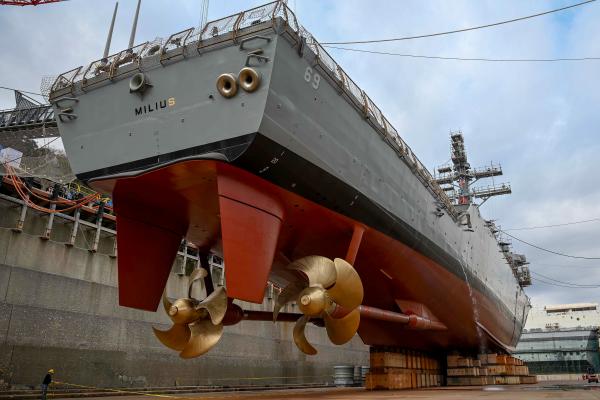
Join Hudson for a discussion highlighting each nation's approach to these common challenges, as well as how US-Japan collaboration should best proceed.

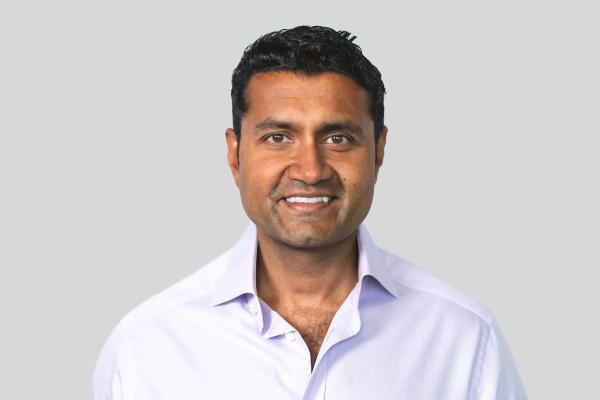
With Walter Russell Mead, Sankar will discuss his strategy to resurrect the American industrial base, win the twenty-first-century defense technology race, and prevent World War III.

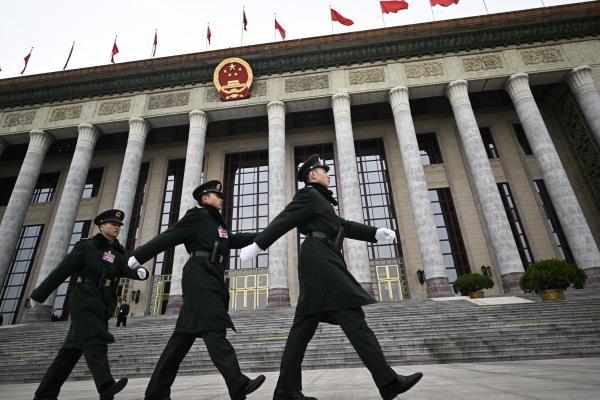
Join Nina Shea for a discussion with Jan Jekielek, author of the new book Killed to Order, about this modern atrocity.
